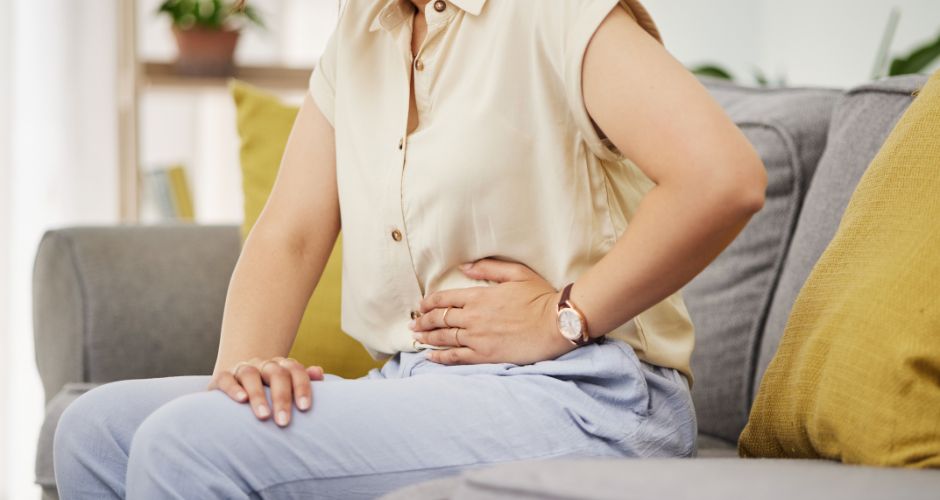11 Signs Your Period is Coming Tomorrow

The intricate dance of the menstrual cycle brings with it a symphony of physical and emotional cues that signal the impending arrival of your period. As a natural and essential aspect of reproductive health, understanding these signs provides valuable insights into the ebb and flow of your body’s rhythms.
In this comprehensive guide, we delve into the 11 Signs Your Period is Coming Tomorrow.
Mood Swings
As the menstrual cycle unfolds, mood swings become a telltale sign that a period is on the horizon. Hormonal intricacies, particularly the ebb and flow of estrogen and progesterone, orchestrate these emotional fluctuations. Estrogen, a pivotal player in mood regulation, takes a dip in the days leading up to menstruation, setting the stage for heightened emotions.

Progesterone, another hormonal protagonist, follows suit, contributing to a landscape of emotional sensitivity. Premenstrual Syndrome (PMS) accentuates these mood swings, making them more pronounced and adding an extra layer to the emotional tapestry. Stress, typically manageable, can evoke stronger responses during this premenstrual phase, creating a heightened sensitivity to daily challenges.
The emotional landscape may be marked by irritability, frustration, and an amplified response to stressors, making even minor issues feel more impactful. This phase often brings a desire for solitude, as individuals navigate the intensity of their emotions before the menstrual flow begins. Recognizing these patterns in mood swings can empower individuals to anticipate and manage their emotional well-being with greater understanding and self-care.
Breast Tenderness
In the intricate choreography of the menstrual cycle, breast tenderness emerges as a distinct sign that heralds the imminent arrival of one’s period. This phenomenon is intricately tied to hormonal fluctuations, particularly the rise and fall of estrogen and progesterone.
As the menstrual cycle progresses, estrogen levels surge, prompting the breast ducts to enlarge and glands to swell in preparation for a potential pregnancy. However, as menstruation approaches, estrogen levels dip, and progesterone takes center stage. This hormonal shift can lead to increased sensitivity and tenderness in the breast tissue.
For many women, this tenderness can extend to the entire breast or concentrate around the outer areas. The sensation is often described as a feeling of fullness, soreness, or heightened sensitivity to touch. While breast tenderness is a common premenstrual symptom, its intensity can vary from person to person, offering a tangible clue that the body is in the final stages of preparing for the menstrual phase.
Understanding and acknowledging these physiological changes can empower individuals to navigate this aspect of the menstrual cycle with greater awareness and self-care.
Bloating
As the rhythmic cadence of the menstrual cycle progresses, bloating emerges as a noticeable harbinger signaling the imminent arrival of one’s period. This phenomenon is intricately linked to hormonal fluctuations, primarily the dynamic interplay between estrogen and progesterone.
In the days leading up to menstruation, estrogen levels begin to decline, paving the way for a surge in progesterone. This hormonal shift can trigger changes in water and sodium retention, leading to bloating and a feeling of abdominal fullness. The body’s intricate response to hormonal cues results in increased fluid retention, particularly in the abdomen, causing a temporary expansion of the waistline.

This premenstrual bloating is a common and natural occurrence, although its intensity can vary among individuals. Embracing an understanding of these physiological changes empowers individuals to navigate the nuances of their menstrual cycle with grace and self-care, acknowledging bloating as a transient aspect of the body’s intricate preparation for menstruation.
Acne Breakouts
In the orchestrated symphony of the menstrual cycle, acne breakouts emerge as a notable prelude to the impending arrival of one’s period. This skin-related phenomenon is intricately tied to hormonal fluctuations, particularly the rise and fall of estrogen and progesterone.
As the menstrual cycle progresses, the body experiences an increase in androgen hormones, which can stimulate the sebaceous glands to produce more oil. This excess oil, coupled with the shedding of skin cells, can lead to clogged pores and the development of acne. In the days preceding menstruation, estrogen levels decrease, allowing androgen hormones to exert a more prominent influence, contributing to the onset of acne breakouts.

While not universal, many women experience this cyclical pattern of skin changes, with the location and severity of acne varying from person to person. Acknowledging and understanding this aspect of the menstrual cycle allows individuals to adopt proactive skin care measures, promoting a sense of empowerment in navigating the natural fluctuations that accompany their monthly cycle.
Recommended – Effective Acne Treatment for Teens
Cravings for Certain Foods
In the intricate choreography of the menstrual cycle, cravings for certain foods take center stage as a distinctive sign that heralds the imminent arrival of one’s period. This phenomenon is intricately linked to hormonal fluctuations, particularly the dynamic interplay between estrogen and progesterone. As the body readies itself for menstruation, hormonal shifts can influence neurotransmitters and trigger a cascade of cravings, often for specific comfort foods.
The surge in hormones, coupled with changes in serotonin levels, can lead to an increased desire for chocolate, salty snacks, or other treats. While these cravings are a common premenstrual symptom, their intensity and specific food preferences can vary widely among individuals.
Acknowledging and understanding the role of hormones in these cravings empowers individuals to approach their dietary choices with mindfulness and self-compassion, recognizing that these fluctuations are a natural part of the intricate dance of the menstrual cycle.
Increased Sensitivity to Smells
As the menstrual cycle unfolds, an intriguing sign that often goes unnoticed is the increased sensitivity to smells, subtly indicating the impending arrival of one’s period. This sensory phenomenon is intricately linked to hormonal fluctuations, particularly the rise and fall of estrogen and progesterone.
In the days leading up to menstruation, estrogen levels gradually decline, and this hormonal shift can heighten the sense of smell. Everyday scents that might typically go unnoticed become more pronounced, and individuals may find themselves more reactive to various odors. While this heightened sensitivity to smells is not universal, many women experience this subtle yet distinct change as part of the premenstrual phase.
Understanding this aspect of the menstrual cycle allows individuals to navigate their surroundings with increased awareness and a deeper understanding of the intricate ways in which hormonal fluctuations influence the senses.
Fatigue
In the nuanced rhythm of the menstrual cycle, fatigue emerges as a subtle but noteworthy sign signaling the impending arrival of one’s period. This weariness is intricately linked to hormonal fluctuations, primarily the dynamic interplay between estrogen and progesterone.
As the body readies itself for menstruation, hormonal shifts can contribute to feelings of lethargy and tiredness. The decline in estrogen levels, coupled with the influence of rising progesterone, may lead to a temporary dip in energy.

This premenstrual fatigue is a common and natural aspect of the menstrual cycle, although its intensity can vary among individuals. Acknowledging and understanding the role of hormones in these energy fluctuations empowers individuals to embrace self-care measures, ensuring they navigate the ebb and flow of their energy levels with grace and mindfulness during the lead-up to their menstrual phase.
Lower Abdominal Discomfort
In the intricate choreography of the menstrual cycle, lower abdominal discomfort takes center stage as a distinctive sign heralding the imminent arrival of one’s period. This discomfort is intricately linked to the preparation of the uterus for menstruation, a process guided by hormonal fluctuations, particularly the interplay between estrogen and progesterone.
As the menstrual cycle progresses, the body experiences uterine contractions and adjustments in the uterine lining, often resulting in a mild ache or discomfort in the lower abdomen. This premenstrual sensation is a common and natural aspect of the menstrual cycle, signaling the body’s readiness for the shedding of the uterine lining.
While the intensity of lower abdominal discomfort can vary among individuals, understanding this physiological response empowers individuals to navigate this phase with awareness and self-care, recognizing it as a temporary and natural part of the menstrual cycle.
Change in Cervical Mucus
As the intricate ballet of the menstrual cycle unfolds, a subtle yet noteworthy sign that heralds the impending arrival of one’s period is the change in cervical mucus. This nuanced transformation is intricately tied to hormonal fluctuations, particularly the dynamic interplay between estrogen and progesterone.
In the days leading up to menstruation, estrogen levels decrease, affecting the character and consistency of cervical mucus. Typically, there is an increase in thickness and stickiness, creating an environment less conducive to fertility. This change is part of the natural cycle of the cervix, preparing for the menstrual phase.
While the details of cervical mucus changes may go unnoticed by many, acknowledging this aspect of the menstrual cycle provides individuals with a deeper understanding of the intricate ways in which hormonal shifts influence the body’s reproductive processes.
Trouble Sleeping
In the orchestration of the menstrual cycle, trouble sleeping emerges as a subtle yet impactful sign indicating the impending arrival of one’s period. This sleep-related challenge is intricately linked to hormonal fluctuations, particularly the dynamic interplay between estrogen and progesterone. In the days leading up to menstruation, these hormones undergo shifts that can influence sleep patterns.
Some women may experience difficulty falling asleep, disruptions in the quality of sleep, or even heightened restlessness during this premenstrual phase. Understanding the connection between hormonal changes and sleep disturbances allows individuals to approach this aspect of the menstrual cycle with mindfulness and proactive strategies.
Establishing a calming bedtime routine, creating a comfortable sleep environment, and prioritizing relaxation techniques can contribute to better sleep quality, ensuring that individuals navigate the ebb and flow of their sleep patterns with grace and self-care.
Heightened Emotional Sensitivity
As the intricate choreography of the menstrual cycle unfolds, heightened emotional sensitivity takes center stage as a poignant sign heralding the impending arrival of one’s period. This emotional delicacy is intricately linked to hormonal fluctuations, particularly the rise and fall of estrogen and progesterone.
In the days leading up to menstruation, estrogen levels gradually decline, influencing neurotransmitters and intensifying emotional responses. Everyday situations may evoke stronger reactions, and individuals may find themselves more attuned to their feelings. This heightened emotional sensitivity is a common and natural aspect of the premenstrual phase, reflecting the intricate interplay between hormones and emotions.
Acknowledging and understanding this emotional nuance empowers individuals to navigate their feelings with self-compassion, recognizing that this heightened sensitivity is a temporary facet of the cyclical nature of the menstrual cycle.
Conclusion
Understanding the signs that your period is coming tomorrow empowers you to embrace your menstrual cycle with knowledge and self-care. By recognizing these indicators, you can navigate the physical and emotional nuances of premenstrual symptoms with grace and preparation.
Recommended – Period Mistakes That Every Girl Should Avoid





